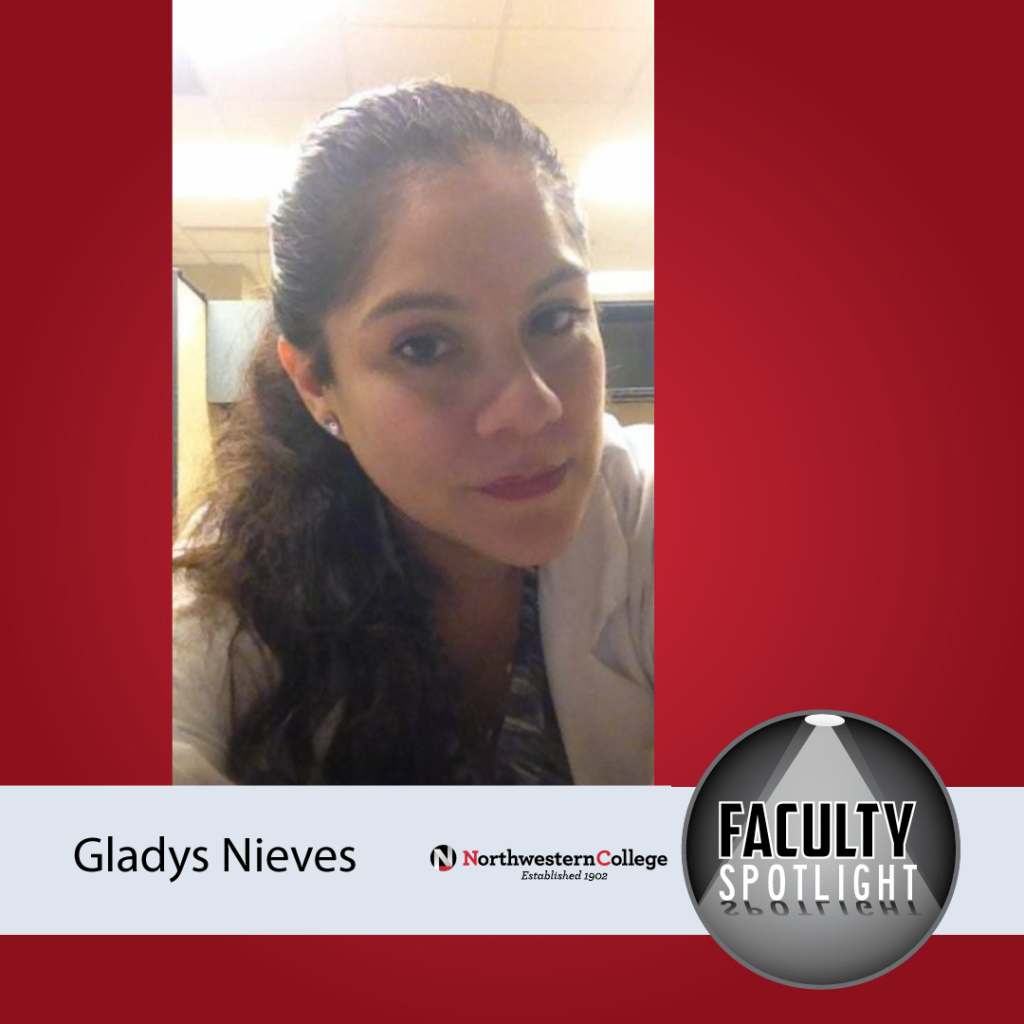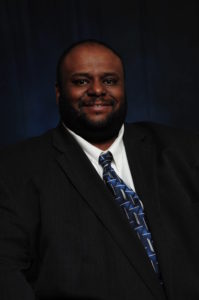 In the 20-plus years Gladys Nieves has worked as a dental assistant, she has witnessed the evolution of the dental industry. She has seen it go from the “dinosaur” era of paper records and unsterilized equipment to the digital record keeping and stiff regulations of today’s world. Nieves, an assistant professor and dental assistant instructor at Northwestern College, has done it all – which is a real bonus for her students.
In the 20-plus years Gladys Nieves has worked as a dental assistant, she has witnessed the evolution of the dental industry. She has seen it go from the “dinosaur” era of paper records and unsterilized equipment to the digital record keeping and stiff regulations of today’s world. Nieves, an assistant professor and dental assistant instructor at Northwestern College, has done it all – which is a real bonus for her students.
How she went from dental assistant to assistant professor
“I have so much under my belt,” Nieves says. “I’ve worked with pediatric dentists. I’ve worked with the best surgeon. I worked in a hospital setting.” After teaching at another college for five years, it closed. She returned to the field and managed a dental office for two years. “It was important for me to go back and see all the digital stuff and how it’s working now,” she says. “It just refreshed everything for me and took me to a better level.” She trained new assistants at her office – something she said prepared her for teaching once again. When an opportunity to teach at Northwestern came up, she jumped on it. “When I went in for my interview and I started telling them what I know and the people I know, they said, ‘You know what? Let’s get you a classroom.’ I never thought that would happen.”
How the dental field has changed
The biggest noticeable industry change has been with regulations. The Health Insurance Portability and Accountability Act of 1996 (HIPAA) was passed to ensure the privacy and security of patients’ healthcare information. OSHA (Occupational Safety and Health Administration) standards have improved. “Back in the day, they [dental assistants] were so afraid to sterilize their doctor’s drills because they thought they would break off and need to be replaced,” Nieves says. “Having such standards … having it nice and sterile for the patient makes everybody safe and the environment safe.” Other changes include the way they take X-rays and radiation dosage. “It just gets better and better – the X-rays, the pictures,” she says.
What she teaches her students
At Northwestern College, dental assistant students learn what they need to work in any type of dental office. “We
teach them here how to chart in a computer setting and also in an old-school paper setting,” she says, “if they get a dentist who still loves his paper charts.” They learn different types of cavities, teeth names and numbers, surfaces, and how to take specific X-rays (depending on whether the patient is in the office because of a dental emergency or routine exam). She says students also learn how to be professional and answer the phones correctly. Nieves has them practice sending emails to cancel or fill appointments. “If the email doesn’t make sense, I correct them so it looks more professional,” Nieves says. “It’s really important for dental assistants to know that.”
How doing an externship helps students
Besides regular classroom study, dental assistant students are required to complete a 120-hour externship in a real dental office. In school, students work on each other as practice. The externship is different. “They need that hands-on experience to see how a real patient reacts with X-rays or a mold in the mouth, so they learn that they have to be gentle about it,” she explains. “Their friends are going to be a little more lenient on them, but the patients are going to be afraid.” Although students are not paid by the host dentist, they are qualifying for graduation. “We let them know – you have to shine in your externship; you have to treat this like it’s your job,” she says. “It’s their incentive to hurry up and finish those hours because they can graduate and get hired. It’s a win-win situation.”
What makes Northwestern College special
“Northwestern College has a beautiful state-of-the-art facility, and a lot of these new doctors – they’re getting that,” Nieves says. “They’re going top-notch with their stuff because they want to impress the patients who come in and are competitive with other new doctors.” Students at Northwestern work in that type of environment, but the comprehensive program prepares them to be able to work in any dental facility. “We touch upon every dental aspect, and then their last term we touch on every specialty there is.” Additionally, Nieves says the students develop strong camaraderie with their classmates. “They help each other out. It’s very important for them to look out for each other as dental assistants. Why don’t you come here? It’s really nice.” Nieves says that in many cases, students end up working for the dentist they externed for. “They train them the way they want them, so they wind up keeping them,” she says. “That’s a foot in the door for the student.”
What the prospects look like for dental assistants
Nieves says dental assistants are more in demand than are dental hygienists because of their varied responsibilities. A dental hygienist cleans teeth and can administer anesthesia. “If they can hire a doctor to clean teeth and do everything, they’ll hire a doctor,” she says. “There’s less chance of employment for dental hygienists.” On the other hand, dental assistants do the bulk of the work. They set up the instruments a doctor needs for any given procedure, take molds for custom impressions of teeth and for creating special appliances, take X-rays and set up bleaching trays. “They need to know the instruments, the functions, the setups,” she explains. “If a doctor’s doing a filling, they need to know what type of filling and what instruments they need for it.” Nieves says that in a typical dentist’s office, they might need three or four dental assistants. In large offices, that number could go up to 15. “I used to work at the hospital, and I’d see 15, 20 assistants and there would be one to two dental hygienists.”
What she likes best about teaching
“I love it when students succeed. They love this program,” she says. As students “get” the program, they begin talking a dental language, Nieves says, is built in the dental community. “We talk about a specific tooth that has a decay on it, and it’s a big deal. Oh, tooth number three has an occlusal decay. Only we know what that means.” She says she loves when they catch on. “That’s what I love about it – when I see them speaking to me the way I know, my language of dental talk. Welcome to my world!”
According to the Bureau of Labor Statistics, employment for dental assistants is expected to grow by 19 percent from 2016 to 2026 – much faster than the average for other occupations. If you think your future career could be as a dental assistant, contact Northwestern College today.
The post Faculty Spotlight: Gladys Nieves, Assistant Professor/Dental Assistant Instructor appeared first on Northwestern College.
from
https://nc.edu/faculty-spotlight-gladys-nieves-assistant-professor-dental-assistant-instructor/



 Christopher Wheat had originally planned on becoming a physician when he entered the University of Chicago as an undergraduate. Fortunately for Northwestern College, he changed his plans. The multi-degreed, multi-awarded Wheat is now Program Director of the college’s new Health Information Management program. How he went from there to here is a fascinating story.
Christopher Wheat had originally planned on becoming a physician when he entered the University of Chicago as an undergraduate. Fortunately for Northwestern College, he changed his plans. The multi-degreed, multi-awarded Wheat is now Program Director of the college’s new Health Information Management program. How he went from there to here is a fascinating story.